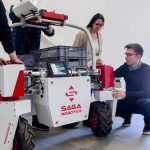Back in 2013, the World Healthcare Organization (WHO) predicted that the global healthcare worker shortage could reach 12.9 million professionals by 2035, making in-person medical appointments a luxury few patients can afford. And the COVID-19 pandemic has only aggravated things. While telehealth and remote patient monitoring (RPM) solutions slightly lessen the burden on the US … [Read more...] about RPA in Healthcare: a Crucial Step Towards Intelligent Automation
Robotics
Robotics is becoming prevalent in our lives. It's crucial to understand its implications for the future of work. Discover all you need to know about robotics here.
What Are the Benefits of Robots as a Service?
Robots have become inseparable from industries like manufacturing and logistics. As automation becomes ever more widespread, those that don't automate could fall behind the competition. Robots as a service (RaaS) aims to democratize automation, helping these smaller businesses experience all the benefits of robotics while avoiding its drawbacks. The cloud robotics industry, … [Read more...] about What Are the Benefits of Robots as a Service?
Which Processes can be Automated using RPA?
Robotic Process Automation (RPA) is the primary driver of digital transformation for many organizations. But where should they start? Is there any specific process that they should begin automating? To be honest, there are hundreds. The 2020-2021 pandemic era lays heavy emphasis on Robotic Process Automation services. A prime example is automated clinical testing for a variable … [Read more...] about Which Processes can be Automated using RPA?
How AI can be your next personal trainer at home?
The Covid-19 pandemic has sounded a considerable alarm in every sector, and no one is immune to its potential consequences. This pandemic has had a negative impact on every industry, whether small, medium, or independent. The employees working from home are mostly underproductive due to a lack of motivation, mental issues, or emotional disorders. So, what exactly is the next … [Read more...] about How AI can be your next personal trainer at home?
AI in Agriculture – Use Cases for Crop and Animal Farming
All you need is (love) AI in agriculture. Š ” ŠA slightly changed Beatles quote. Modern-day farming gets smarter by the day: a symbiosis of cows and drones has never felt so natural and necessary. And surely it means that AgriTech creates more and more data while automating greenhouses through IoT, monitoring field variability in precision agriculture solutions, and so on. But … [Read more...] about AI in Agriculture – Use Cases for Crop and Animal Farming
What is robotics?
Robotics refers to the branch of technology that deals with designing and operating robots. Robotics also deals with artificial intelligence — the ability of machines to carry out tasks that would normally require human intelligence, like understanding natural language and recognizing objects. Want to learn more about robotics? Datafloq has courses available. Contact us to get started.
What are robots used for?
Robots are used in industrial and commercial settings for welding, fabricating, testing, measuring, and inspection. In addition, they can work in dangerous or difficult environments that would otherwise be unsafe for human workers.
At home, robots are commonly used as vacuum cleaners, lawnmowers, and window cleaners. Some more advanced home robot models can also perform complex tasks such as making a bed or folding laundry. As technology continues to evolve, the number and variety of tasks robots can perform will likely continue to grow.
What are the different types of robots?
There are many different types of robots, each designed for a specific purpose. Some robots are designed for manufacturing tasks, such as welding or fabricating parts. Others are for logistics tasks, such as moving materials around a warehouse. There are also robots that are designed for domestic chores like vacuuming or mowing the lawn.
Each type of robot has its strengths and weaknesses, and the right type of robot for a given task will vary depending on the job’s specific requirements. When choosing a robot, it is important to carefully consider the capabilities of each type to ensure that the right tool is selected for the job at hand.
What are the advantages of robots?
Robots have many advantages over human workers. They can work faster, with more precision, and are not affected by environmental conditions. They can work 365 days a year without rest and don’t require breaks or vacations. Additionally, they are not affected by emotions or physical needs, so they can maintain peak performance at all times.
Robots can also be programmed to perform specific tasks, which helps minimize mistakes. Finally, the long-term costs involved with robots are more affordable, as there is no need for health insurance or other benefits. In short, robots offer several advantages over human workers, making them an attractive option for many businesses.
What is the future of robotics?
In the near future, robots will likely become increasingly commonplace in commercial and residential settings. One area where robots are already making an impact is the healthcare industry. Robots are being used to assist surgeons, transport patients, and dispense medication.
They are also being developed to provide companionship and care for the elderly and infirm. As robotics technology continues to advance, the scope of what robots can do is likely to expand even further. Ultimately, the future of robotics will likely be defined by the imagination of those who create them.







